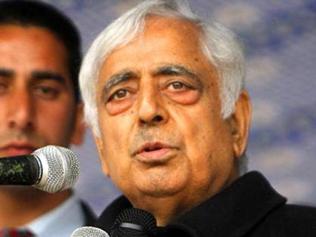Jammu and Kashmir Chief Minister Mufti Mohammad Sayeed, a crafty politician who took on the powerful Abdullah family and rose to become the country's first Muslim Home Minister, died today at AIIMS here after his platelets dropped dangerously.
 Sayeed, 79, who took charge of the state on March 1 last year heading a PDP-BJP alliance, breathed his last this morning after remaining on ventilator for the past few days.
Sayeed, 79, who took charge of the state on March 1 last year heading a PDP-BJP alliance, breathed his last this morning after remaining on ventilator for the past few days.
He was flown from Srinagar in a special plane on December 24 and admitted to the AIIMS where he was diagnosed with sepsis (life threatening complication of an infection) and pneumonia. During hospitalisation his platelets had dropped dangerously, doctors said.
He is the second J and K Chief Minister to die in office, the first one being Sheikh Mohammad Abdullah who died on September 8, 1982.
Sayeed's daughter 56-year-old Mehbooba is expected to take over as the first woman Chief Minister of the state with PDP leaders throwing their weight behind her. But this will require the approval of BJP.
Sayeed is survived by his wife, three daughters and a son.
Jammu and Kashmir government has declared a seven-day mourning and holiday today. Flags will be flown at half mast.
The mortal remains of the Chief Minister would be flown to Srinagar where the body will be kept for people to pay homage. He is likely be buried in his ancestral village Bijbehera in South Kashmir, about 48 kms from Srinagar.
Sayeed took over as chief minister of PDP-BJP coalition on March 1 last year. In the 87-member J and K Assembly PDP won 28 seats and BJP 25 while opposition National Conference got 15 and Congress 12.
Condoling the death of Sayeed, Prime Minister Narendra Modi said it left a huge void in the nation and that the leader who provided a healing touch would be missed.
"What stood out about Mufti Sahab was his statesmanship. In his long political journey he won many admirers across the political spectrum," Modi said.
Home Minister Rajnath Singh will be flying to Srinagar to attend Sayeed's funeral.
Congress President Sonia Gandhi also expressed grief over the demise of Mufti as she communicated her condolences to his wife and Mehbooba.
"In his death, the state of Jammu and Kashmir as indeed the entire nation has lost a great leader," she said.
Former Jammu and Kashmir Chief Minister Omar Abdullah, who expressed his condolences to Sayeed's family at AIIMS, tweeted, "Just heard the terrible news of Mufti Sahib's passing away. I'm shocked and deeply saddened. May he rest in peace".
Former Union Minister Farooq Abdullah also condoled the death of Sayeed.
In a political career spanning nearly six decades, Sayeed carved a niche for himself in national and Jammu and Kashmir politics with the craftiness and unwavering focus of an avid bridge player he was.
He emerged as a rival power centre to the mighty Abdullahs, always playing his cards close to the chest, while making friends with parties following conflicting ideologies to suit his political agenda.
The high-points in the political journey of Sayeed, who would have turned 80 on January 12, was his being catapulted to the chair of free India's first Muslim Home Minister in 1989 in the V P Singh government and, years later, becoming the Chief Minister of the restive state for a second time in 2015, heading a coalition with BJP, which had its first brush with power in the only Muslim-majority state.
Sayeed's stint in the Home Ministry, at a time when militancy had begun to rear its ugly head in his home state, would, however, be most remembered for the kidnapping of his third daughter Rubaiya by JKLF. The militants demanded freeing five of their comrades in exchange for Rubaiya's freedom and let her off only after their demand had been met.
The kidnapping and subsequent release of the militants, according to Sayeed's rivals, projected India as a "soft state" for the first time.
Born in Baba Mohalla of Bijbehara in Anantnag district on January 12, 1936, Sayeed had his early education at a local school and graduated from S P College, Srinagar. He went on to obtain a law degree and Master's degree in Arab History from Aligarh Muslim University.





Comments
Add new comment